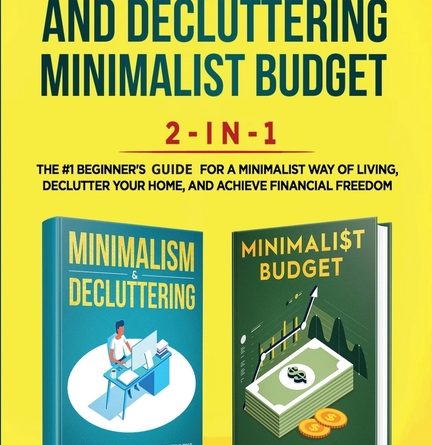
Imagine a life free from financial stress, where your money is neatly organized and serving its purpose. Introducing “The Ultimate Guide to Minimalism for Decluttering Your Finances.” In this comprehensive article, we will explore the principles of minimalism and how they can be applied to your financial life. By simplifying your expenses, eliminating unnecessary clutter, and prioritizing your financial goals, you can achieve a sense of freedom and control over your money. So, let’s dive into this friendly guide that will help you declutter your finances and create a more balanced and fulfilling financial future.
Table of Contents
The Ultimate Guide to Minimalism for Decluttering Your Finances

This image is property of Amazon.com.
1. Understanding Minimalism and its Benefits
Minimalism is a lifestyle that focuses on simplicity and intentional living. It is about decluttering and simplifying every aspect of your life, including your finances. By embracing minimalism, you can gain control over your money, reduce financial stress, and achieve financial freedom.
One of the key benefits of minimalism is that it allows you to prioritize what truly matters to you. By eliminating unnecessary expenses and focusing on what brings you joy and fulfillment, you can align your spending with your values and goals.
2. Assessing Your Financial Situation
Before you can begin decluttering your finances, it is essential to assess your current financial situation. Take the time to gather all of your financial documents, such as bank statements, credit card bills, and loan statements. Review your income, expenses, and debt.
Take note of any areas where you may be overspending or wasting money. This could include monthly subscriptions you no longer use, excessive dining out, or impulse purchases. Understanding your financial situation will allow you to identify areas for improvement and set clear financial goals.
3. Simplifying Your Budget
A cluttered budget can make it difficult to track your spending and make informed financial decisions. Simplifying your budget is an essential step in decluttering your finances. Start by categorizing your expenses into broad categories such as housing, transportation, food, and entertainment.
Eliminate any unnecessary budget categories and consolidate similar expenses. For example, if you have separate categories for streaming services like Netflix, Hulu, and Amazon Prime, consider creating a single category for entertainment. Simplifying your budget will make it easier to track your spending and make adjustments as needed.
4. Cutting Unnecessary Expenses
Cutting unnecessary expenses is a fundamental aspect of minimalism. Take a close look at your budget and identify expenses that do not align with your values or financial goals. This could include unused gym memberships, excessive dining out, or impulse purchases.
Consider alternatives or more cost-effective options for these expenses. For example, if you rarely use your gym membership, cancel it and opt for outdoor workouts or workout videos at home. Cutting unnecessary expenses will not only save you money but also reduce the clutter in your financial life.

This image is property of Amazon.com.
5. Streamlining Your Banking and Credit Cards
Having multiple bank accounts and credit cards can add unnecessary complexity to your financial life. Streamlining your banking and credit cards is an important step in decluttering your finances. Consolidate your bank accounts and credit cards to reduce clutter and make it easier to track your transactions.
Choose a bank that offers a user-friendly online banking platform and consider opting for a credit card with rewards that align with your spending habits and goals. By streamlining your banking and credit cards, you can simplify your financial management and reduce the risk of overspending or missed payments.
6. Eliminating Debt
Debt can be a significant source of financial stress and clutter. As a minimalist, strive to eliminate debt as much as possible. Start by creating a debt repayment plan and prioritize paying off high-interest debt first. Consider consolidating your debts or negotiating with creditors for lower interest rates or repayment terms.
While eliminating debt may take time and discipline, it is a crucial step towards achieving financial freedom. As you pay off debt, you will free up more money to allocate towards your financial goals and reduce the burden on your monthly budget.

This image is property of Amazon.com.
7. Organizing and Digitizing Financial Documents
Paper clutter can easily accumulate in your financial life. To declutter your finances, organize and digitize your financial documents. Start by sorting your documents into categories such as tax records, bank statements, and insurance policies. Create a filing system or use digital storage solutions to keep your documents organized and easily accessible.
Digitizing your financial documents can also provide added security and convenience. Consider using cloud storage or a document management software to store and manage your financial documents. This will help reduce physical clutter and ensure that you can access important information whenever you need it.
8. Creating an Emergency Fund
One of the key principles of minimalism is to be prepared for unexpected events. Creating an emergency fund is an essential step in decluttering your finances and protecting yourself from financial stress. Aim to save at least three to six months’ worth of living expenses in your emergency fund.
Start by setting up a separate savings account specifically for your emergency fund. Automate regular contributions to this account to make it a priority. Having an emergency fund will provide you with peace of mind and financial security, allowing you to navigate unexpected expenses without derailing your overall financial goals.

This image is property of i5.walmartimages.com.
9. Investing in Quality
Minimalism is not about deprivation, but rather about making intentional choices with your money. When it comes to purchasing items, prioritize quality over quantity. Investing in quality may require a larger upfront investment, but it can save you money in the long run.
For example, instead of buying cheap clothing that quickly wears out, invest in higher-quality pieces that will last longer. The same principle applies to other purchases, such as electronics, furniture, and household appliances. By investing in quality, you reduce the need for frequent replacements and minimize clutter in your home and finances.
10. Adopting Mindful Spending Habits
Mindful spending is a central aspect of minimalism. It involves being intentional and deliberate with your purchases, considering whether they align with your values and goals. Before making a purchase, ask yourself if it is necessary or if it will bring you long-term satisfaction.
Avoid impulse buying by implementing a waiting period for non-essential purchases. Give yourself a few days or even weeks to evaluate whether you truly need or want the item. Practicing mindful spending will help you avoid unnecessary clutter in your life and ensure that your money is spent on things that truly bring you joy and value.

This image is property of Amazon.com.
11. Evaluating and Adjusting Regularly
Finally, it is essential to regularly evaluate and adjust your financial habits and decisions. Financial circumstances and priorities can change over time, and it is important to adapt accordingly. Set aside time each month or quarter to review your budget, track your progress towards your financial goals, and identify areas for improvement.
Revisit your financial goals periodically to ensure they still align with your values and aspirations. Make adjustments to your budget as needed and continue to prioritize simplicity and minimalism in your financial life. By regularly evaluating and adjusting, you can maintain control over your finances and avoid clutter in the long run.
In conclusion, adopting a minimalist approach to your finances can bring numerous benefits, from reducing financial stress to achieving financial freedom. By understanding minimalism, assessing your financial situation, simplifying your budget, cutting unnecessary expenses, streamlining your banking and credit cards, eliminating debt, organizing and digitizing financial documents, creating an emergency fund, investing in quality, adopting mindful spending habits, and regularly evaluating and adjusting, you can declutter your finances and live a more intentional and fulfilling financial life. Embrace minimalism and take control of your financial well-being today!







